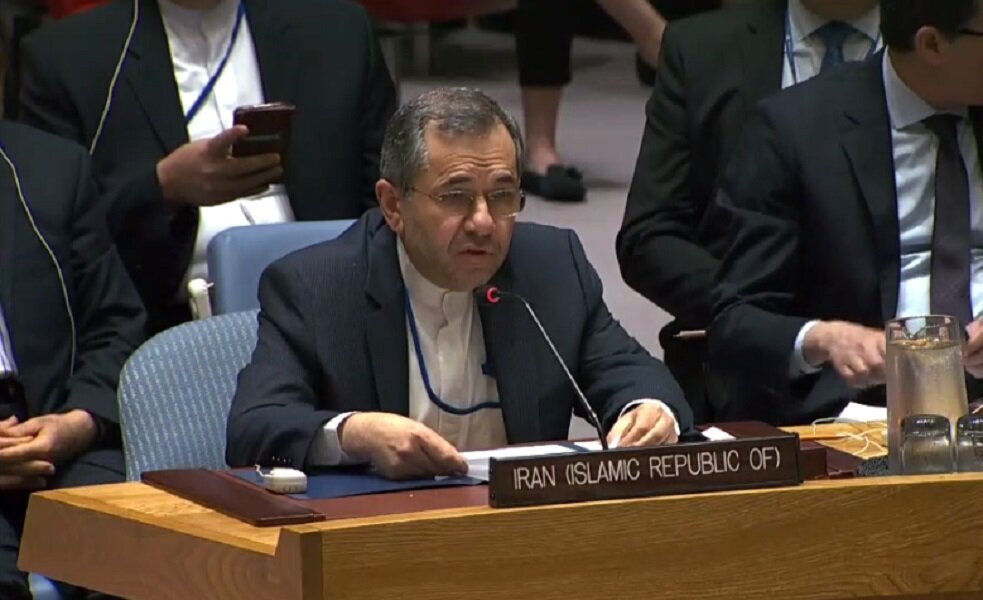Sanctioning Zarif is violation of UN Charter: diplomat

TEHRAN - Majid Takht Ravanchi, Iran’s permanent representative to the United Nations, wrote a letter to UN Secretary General Antonio Guterres on Tuesday protesting the U.S. sanctions on Iranian Foreign Minister Mohammad Javad Zarif, saying that this move signifies a “gross violation” of the UN Charter.
Following is the text of the letter published by ISNA:
I am writing to you to bring to your kind attention to yet another unlawful and undiplomatic move by the government of the United States against my country, i.e. the imposition of illegal sanctions against H.E. Dr. Mohammad Javad Zarif, Minister of Foreign Affairs of the Islamic Republic of Iran, in gross violation of the fundamental norms and principles of international law, including the purposes and principles of the Charter of the United Nations.
Takht Ravanchi says sanctions on Zarif “signifies that the U.S. regime despises diplomacy… and reveals the deeply-rooted hypocrisy of the United States’ authorities in their different but paradoxical claims.”
Ironically, the officials of the current administration of the United States have claimed that the illegal sanctions have been imposed due to the role and position of our Foreign Minister, who is the responsible authority for the foreign policy of the Islamic Republic of Iran. Infatuated with rogue, unreasonable conducts at the international level, this well signifies that the U.S. regime despises diplomacy, which is one of the greatest achievements of humanity to preserve and uphold peace and security among nations. It reveals the deeply-rooted hypocrisy of the United States’ authorities in their different but paradoxical claims.
Although the unlawful move is claimed to target Iran’s Minister of Foreign Affairs, considering the official and shameless claims of the U.S. administration, this illegal restriction is part of its overall policy in waging economic terrorism against the Iranian people and bringing pressure to bear on their representatives.
The Islamic Republic of Iran deems such illegal action a flagrant infringement of the fundamental principles of diplomatic law, in particular the principle of inviolability and immunity of high-ranking foreign officials, including immunity of incumbent ministers of foreign affairs, as a universally accepted norm and rule of customary international law.
Taking into account the restrictions imposed on the travel and activities of Minister Zarif during his recent visit to New York to participate in the United Nations events, the U.S.’ illegal action is also in brazen violation of Article 105(2) of the United Nations Charter regarding the privileges and immunities of representative of Member States in exercising their functions in connection with the United Nations. In this context, any restriction on discharging the duties of Ministers of Foreign Affairs is also in contravention of the Convention on the Privileges and immunities of the United Nations, the well-established customary principles enshrined in the Vienna Convention on Diplomatic Relations, and the Agreement regarding the Headquarters of the United Nations.
Likewise, it is in contradiction with many relevant consensual resolutions of the United Nations General Assembly, the latest of which is resolution 73/212 that, by underlining the obligation of the United States for the observance of the privileges and immunities of the missions accredited to the United Nations, “which cannot be subject to any restrictions arising from the bilateral relations of the host country”, “urges the host country to remove without delay any restrictions applied” and “to ensure respect for such privileges and immunities”.
Furthermore, the principle of diplomatic immunity lies at the core of international law and any derogation from this principle is a serious threat to the sound conduct of normal international relations and the promotion of cooperation among States. The illegal imposition of sanctions on the Minister of Foreign Affairs of the Islamic Republic of Iran also violates the principle of sovereign equality of States and the principle of par in parem non habet imperium, which constitutes the basis for the immunity ratione materiae of States officials, including in particular ministers of foreign affairs.
At the same time, the ramifications of the United States’ unlawful action are not confined to the legal context only. The brazen violation of the fundamental principles of international law, which have thrived and been respected throughout history, and coercing nations into complying with the United States’ illegal demands threatens multilateralism, as the foundation of international relations, and sets a dangerous precedent, paving the way for those who aspire to rather divide, not unite, nations.
It will also undermine the call for dialogue and diplomacy and embolden those who seek to endanger international stability and peaceful co-existence of nations.
Thus, it is imperative for the international community to condemn the United States’ unlawful behavior in the interest of promoting multilateralism.
The United Nations, its Member States and its bodies should stand firm in defending the established principles of international law. Respectfully, the Islamic Republic of Iran expects your Excellency to play your active role in preserving the integrity of the United Nations in line with your responsibility to counter the current dangerous trend.
